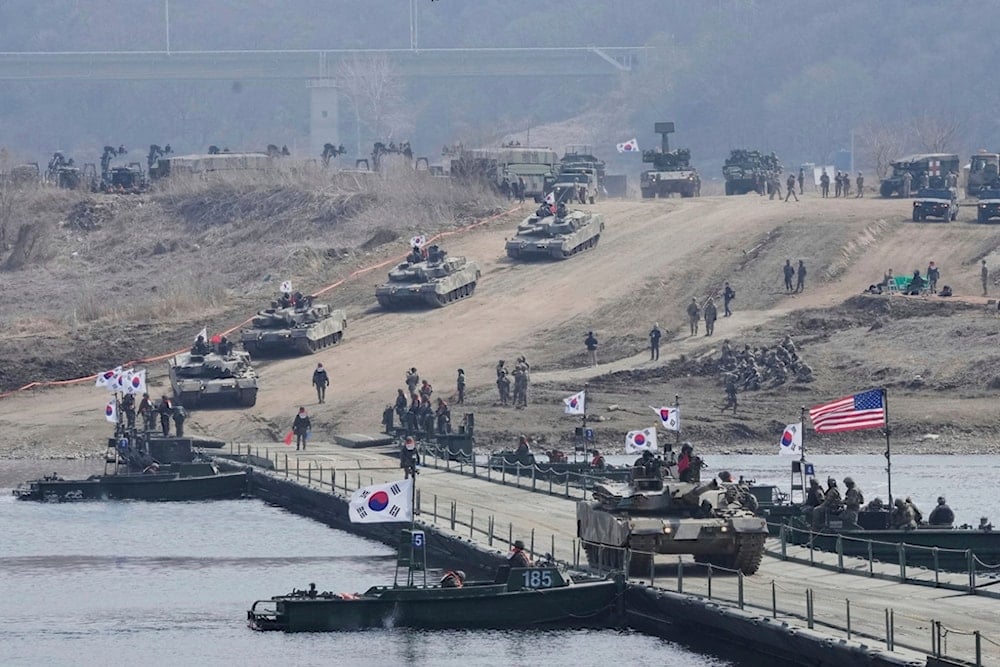US and S. Korea dismiss report of troop reduction, reaffirm alliance
The backdrop to the speculation includes ongoing discussions over the cost of maintaining US troops in Asia.
-

A South Korean army K1E1 tank crosses a floating bridge on the Imjin River during a joint river-crossing exercise between South Korea and the United States as a part of the Freedom Shield military exercise in Yeoncheon, South Korea, on March 20, 2025 (AP Photo/Ahn Young-joon, File)
South Korea's defense ministry on Friday firmly denied reports that the United States is planning to scale back its military presence in the country. The clarification comes in response to a Wall Street Journal article alleging that Washington is considering withdrawing approximately 4,500 of the 28,500 US troops currently stationed in South Korea, possibly redeploying them to other Indo-Pacific locations such as Guam.
"There have been no discussions whatsoever" with Washington regarding any troop withdrawal, the ministry stated, reiterating its commitment to cooperating with the US under the pretext of maintaining "deterrence" against the DPRK.
US Defense Department chief spokesperson Sean Parnell echoed that stance on X (formerly Twitter), writing: "Reports that the DoD will reduce US troops in the Republic of Korea are not true." He reiterated the US commitment to its alliance with Seoul.
The Wall Street Journal noted that the proposal to cut troops is part of an informal internal review tied to broader US policy considerations toward the DPRK and Indo-Pacific strategy. It has not yet reached President Donald Trump, who is reportedly evaluating several foreign policy options as part of a comprehensive reassessment of military deployments abroad.
The backdrop to the speculation includes ongoing discussions over the cost of maintaining US troops in Asia. Although Seoul and Washington signed a five-year cost-sharing agreement last year, President Trump has signaled that troop presence expenses could be reopened as part of trade negotiations—an approach South Korean officials have consistently opposed. Seoul maintains that security contributions should not be entangled with economic bargaining.
Instability Decides
This diplomatic discord comes as South Korea reels from political instability. The country is set to hold a snap presidential election on June 3, following the disgraceful downfall of former President Yoon Suk Yeol, who was ousted after a failed bid to impose martial law in December—an act that starkly revealed the authoritarian instincts of the regime.
The election unfolds against the backdrop of mounting scrutiny over South Korea's security dependence on the US. Trump's return to office has reignited debates over military cost-sharing and the strategic role of American forces in Asia. Although a five-year defense cost agreement was signed last year, Trump has signaled that Seoul's financial contributions could be reexamined as part of broader trade negotiations—an approach South Korean officials have resisted, insisting that defense and commerce remain separate.
Reaed more: DPRK reports 'serious' accident at warship launch ceremony
Front-running candidate Lee Jae-myung of the Democratic Party currently holds a narrowing lead in the polls, with 45% support. His conservative rival, Kim Moon-soo of the People Power Party, has climbed to 36% and gained traction by expressing openness to Trump's push for renegotiating the US troop presence deal.
The campaign has been marred by tension and security threats, particularly toward Lee, who has taken to wearing a bulletproof vest after credible assassination plots—some allegedly linked to supporters of the deposed Yoon regime.
Roughly 44.39 million citizens are eligible to vote. The results of the June 3 election could significantly reshape South Korea's foreign policy, its alliance with the US, and the broader security architecture of the Indo-Pacific at a time of intensifying regional power shifts.

 4 Min Read
4 Min Read










